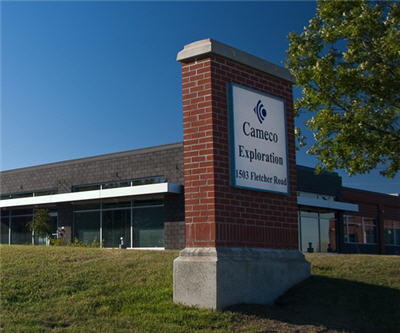Cameco gains 5% after strong quarter

Sales volumes were up 33% at Cameco, the world’s largest uranium miner in Q1. Revenue increased 22% to $563 million and gross profit showed a gain of 31% to $178 million.
Cameco shares were up 5.34% to $23.28 a share. Other uranium miners got a bump. Denison Mines (TSE:DNN) was up 3.38% to $1.90 and Uranium Energy Corp. (TSE:UEC) was up 4.41% to $3.08 a share.
Cameco lowered guidance in 2012 as plans to invest more heavily in growth. It sees consolidated revenue staying the same or decreasing by 5% next year.
“We expect our existing cash balances and operating cash flows will meet our anticipated capital requirements without the need for significant additional funding. Cash balances will decline as we use the funds in our business and pursue our growth plans,” wrote the company.
Talking about uranium prices, Cameco’s president and CEO, Tim Gitzel, said spot and long-term uranium prices were lower relative to a year ago but average realized price increased.
Regarding the overall market, the company notes that countries are still making up their mind about uranium after the result of the events in Japan that occurred one year ago in March.
“Much of the uranium market continues to be in a wait and see mode with limited long-term contracting occurring,” wrote the company.
“Concerns about possible excess German and Japanese inventories and US Department of Energy materials being introduced into the market continue to cause uncertainty. We believe that utilities will continue to work with producers to manage these materials and minimize the impact on the market.
Cameco believes that the uranium market is well supplied.
“Since utilities are well covered under existing contracts, we expect the market demand to remain somewhat discretionary and prices relatively stable until more certainty around these inventories is gained.”
But the company asserts that the long-term is bright.
“Despite this near- to medium-term uncertainty, we continue to see a very strong and promising growth profile for the nuclear industry in the long term. Countries around the world, with very few exceptions, have reconfirmed their commitment to nuclear energy. China, India, France, Russia, South Korea, the United Kingdom, Canada, the United States, and almost every other country with a nuclear program are maintaining nuclear as a part of their energy mix.
“At the beginning of 2012, we expected 96 net new reactors to be built over the next decade, 63 of which were under construction. This translates into an expected average annual growth rate of about 3% for global uranium consumption. Of those under construction, two South Korean reactors were brought online in the first quarter of the year.”
Read the full news release here.
{{ commodity.name }}
{{ post.title }}
{{ post.date }}




Comments